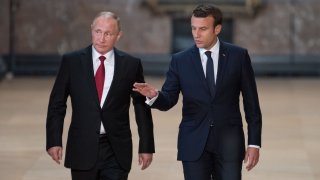Can Emmanuel Macron End the Russia-Ukraine War?
European strategic autonomy could be the key to securing Ukraine and the peace of the continent.
French President Emmanuel Macron is laying out his vision of “a Europe that commands respect and ensures its own security.” He maintains Ukraine is part of this “European family” and “destined to join the Union when the time comes.”
These goals—European “strategic autonomy” and an entirely European Ukraine—could be more connected than even Macron realizes. As Ukraine struggles on the battlefield to overcome Russia’s advantages in manpower and materiel, Macron may have the chance to 1) end a war that has devastated Ukraine, 2) bring Ukraine into the European Union, and 3) help transform the continent into the “Power Europe” that he envisions.
A recent article in Foreign Affairs confirms that Russian negotiators agreed, during failed negotiations early in the war, that Ukraine could join the EU as part of a peace deal. Gaining EU membership would fulfill Ukraine’s longstanding goal of becoming more integrated into a free and prosperous Europe. It could also give Kyiv the security guarantees that it understandably desires in case Moscow attacks again in the future. Less well known than NATO’s collective self-defense policy, the EU’s common security policy obligates members to aid a member state that has suffered “armed aggression on its territory.”
The EU historically has allowed neutral and non-aligned members to opt out of common security. However, while Moscow would prefer that Ukraine become a neutral buffer state, the post-war settlement would be more stable if Europe reduced Kyiv’s sense of vulnerability. Plus, the EU stands to benefit from Ukraine’s combat-experienced military.
Of course, Kyiv would rather obtain security guarantees from America, the leading military superpower. However, according to the Foreign Affairs article cited above, that’s “a nonstarter for Washington.” Luckily for Ukraine, Europe is looking to bolster its own military capabilities in an uncertain, multipolar age.
As Europe prepares for another “America First” Trump administration and reels from a Russia-Ukraine war in its third year, Macron isn’t the only EU leader promoting military self-sufficiency. “Russia’s war of aggression has brought a great sense of urgency to step up our industrial defense capacities,” said EU foreign policy chief Josep Borrell in March. A month earlier, EU President Ursula von der Leyen urged Europe to “[take] responsibility for its own security,” noting, “We do not have control over elections or decisions in other parts of the world.”
A report in Politico says NATO and the EU are butting heads as the latter becomes more assertive on defense. Some are calling for the next European Commission to appoint the first-ever defense commissioner, whose role would be to fund Europe’s arms industry adequately.
But would an EU commitment to defend Ukraine be credible? Increasingly, the answer is yes, thanks largely to Macron. On several occasions, the French president has raised the possibility of sending Western forces to Ukraine—a proposal that opposition leaders have found distressingly sincere and which Moscow apparently is taking seriously—and, recently, he suggested that Paris could “Europeanize” its nuclear arsenal, bringing all of Europe under France’s nuclear umbrella. With these steps, the Élysée Palace is trying to create “strategic ambiguity,” so that Putin thinks the West might intervene if he ramps up his aggression against Ukraine.
Given Russia’s increasingly favorable negotiating position, Moscow may be less willing than it was two years ago to greenlight Ukraine joining the EU. To make Ukraine’s participation in the EU’s common security framework more palatable to Putin, Macron should rally European leaders to pledge that, in return, they will block Ukrainian accession into NATO, which Washington started pushing for at the Bucharest Summit in 2008 despite vociferous Russian opposition. Additionally, the French and Ukrainian presidents should promise that only European nations—not America—will cooperate militarily with Ukraine after the war. U.S. efforts to NATO-ize Ukraine, both de facto and de jure, clearly made an invasion by Putin more likely. Now, to resolve the conflict, that fateful strategic error should be undone.
Committing to defend Ukraine without American support would spur EU nations to continue shouldering a greater defense burden and enhancing military cooperation. It would also enable the United States to offload some of its own defense commitments as it shifts focus to China. Since Ukraine is a peripheral security interest for the United States, Washington should make absolutely clear that it would not be pulled into war with Moscow if Europe’s NATO nations, should they come to Ukraine’s defense in the future, are attacked by Russia in response. And European capitals should make clear—to Moscow, Washington, and Kyiv—that America’s NATO obligations wouldn’t cover such a scenario.
Of course, the United States wouldn’t take kindly to a European vassal asserting control over the Ukraine crisis, but breaking the vassalage would be precisely the point for Macron. And if Europe, Ukraine, and Russia all agreed to end the fighting and pursue the modus vivendi described above, there would be overwhelming pressure on Washington to step aside and give peace a chance. The brutal, destructive war would finally end, and the sovereign Europe that Macron dreams about would be a few steps closer to reality.
Andrew Day is the Strategic Coordinator at the Nonzero Foundation and a Contributing Fellow at Defense Priorities. Follow him on X: @AKDay89.
Image: Frederic Legrand - COMEO / Shutterstock.com

